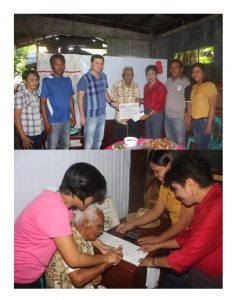
For paving the foundation for what the Philippines is today, the government recognizes the elderly sector’s contributions in nation building by awarding cash incentives, among others, to centenarians through the Department of Social Welfare and Development (DSWD).
Signed into law on June 23, 2016, Republic Act 10868 or the “Centenarians Act of 2016” all Filipinos who reach the age of one hundred (100) years old, whether residing in the Philippines or abroad, shall be honored with a Letter of Felicitation from the President of the Philippines congratulating the celebrant for his or her longevity and a centenarian gift in the amount of one hundred thousand pesos (₱100,000).
For region 02, DSWD has released cash incentives to thirteen (13) centenarians out of the 103 identified beneficiaries.
“Our centenarians have been waiting for this gift since the approval of the law last year and now, we are gla to be part of this recognition to our elderly whose contributions to our society we are presently enjoying,” said DSWD Field Office 02 Regional Director Ponciana P. Condoy.
She also shared that the tenacity of the centenarians provide inspiration to the public to value their health and life in order to spend more time with their families and serve the community.
Partnership with the LGUs
In the implementation of the Centenarian Act, the local government units (LGUs), through the City/Municipal Social Welfare and Development Office (C/MSWDO) takes the lead in the identification and validation of the beneficiaries. They submit validated masterlist of centenarians to DSWD Field Offices with the supporting documents.
Meanwhile, the OSCAs also take an active role in the implementation of the Act by updating and validating the list of seniors in their jurisdictions.
Documentary requirements
In order for a centenarian to avail of the incentives, he or she must present his or her birth certificate or Philippine passport for verification of the C/MSWDO and OSCA. If said documents are not available, the centenarian may present his or her senior citizen’s identification (ID) card or any other Philippine government -issued ID which shows his or her citizenship and date of birth.
Other alternative documents, just in case the above mentioned primary IDs are still not available, are marriage certificate, old school documents, baptismal or confirmation records, birth certificate of children, or an affidavit executed by at least two (2) disinterested persons at least 80 years old with personal knowledge of the centenarian’s actual age or date of birth. The Field Office continues to monitor and validate the documents of reported centenarians to facilitate the release of their cash incentives. ### By: Gela Flor R. Perez, Regional Information Officer II

